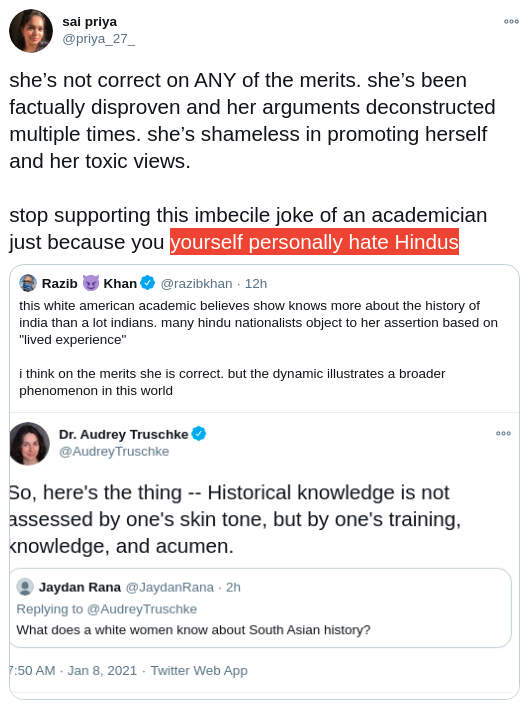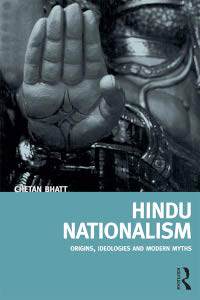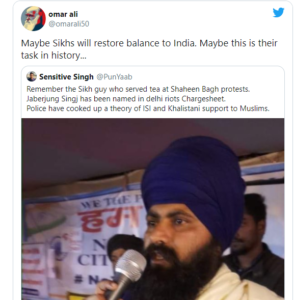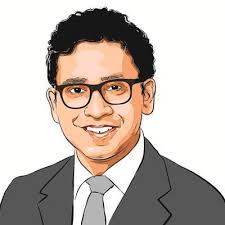
Every few weeks or so I “get into it” with parts of Hindutva Twitter. Some parts of Hindutva Twitter I’m quite friendly with. Other parts, not so much. There is the weird incel-like “Trad Twitter” faction…that always ends up to be strange perverts. But I don’t want to focus on them.
Rather, I want to highlight what I feel is descriptively a fact that though Hindutva and “Woke” factions are opposed in a theoretical sense, the former draws on the style of “thinking” of the latter quite a bit. E.g., the emphasis on many Hindutva sectors on feeling, the lack of humor, and, identitarianism.
 The identitarianism is straightforward. Despite the fact that I’m an atheist they regularly accuse me of being a Muslim. In some cases, this is an honest false positive. Look at my name! In other cases, they assume since I’m making fun of them, I must be a secret sulla with Muhammad or whoever. I’m against them, so I’m for their enemies, or with their enemies. Sometimes they revert to forms of racism (e.g., they are upper-caste Punjabis, so genetically superior, despite being J1 Dasyus!). The ultimate takeaway is the fixation on the group and historical identity, rather than updating to individual identity.
The identitarianism is straightforward. Despite the fact that I’m an atheist they regularly accuse me of being a Muslim. In some cases, this is an honest false positive. Look at my name! In other cases, they assume since I’m making fun of them, I must be a secret sulla with Muhammad or whoever. I’m against them, so I’m for their enemies, or with their enemies. Sometimes they revert to forms of racism (e.g., they are upper-caste Punjabis, so genetically superior, despite being J1 Dasyus!). The ultimate takeaway is the fixation on the group and historical identity, rather than updating to individual identity.
Remember when Ayanna Pressley said someone had to be “politically black” to be black? A sort of primitive identitarianism has taken root amongst Woke people where individual views are derived from group identity, and individual views can negate one’s group identity because the two are so closely tied.
Second, the lack of humor. On my Twitter posts, I engage in a lot of prodding and poking at Hindu shibboleths as well as synthesizing it with absurd genetic points. The whole performance is ludicrous…but some portions of Hindutva Twitter find it problematic. OK, they wouldn’t say “problematic,” but it’s the same reaction. Woke ideology is a form of secular sacredness. Similarly, Hindutva Twitter has sacred cows which I gore now and then. Sometimes people react back playfully…but other times, they don’t get the joke, and when others point out that it’s a joke, they refuse to believe it’s a joke and move to identitarianism. That is, the joke is fake, and I’m actually a Muslim.
A truncated and shriveled sense of humor is common on the modern Woke Left (google Social Justice Comedy; it’s like Communist opera). It is also a feature of very religious Muslims and Christians. A portion of Hindutva Twitter suffers from this.
The last to me is the most important, the emphasis on feeling. This is a personal bias, as I’m a bit “dead on the inside,” so have always been weak on the feels. I hurt the feelings of these people, making fun of them, mocking them, and making light of their culture. I’m a bit of an online barbarian, like the scorpion, I’m going to sting. A portion of Hindutva Twitter can’t understand that my behavior isn’t due to the fact that I hate Hindus, but because I’m an unfeeling asshole. I’m R1a1a-Z93 and U2b. Those who know what this means know that I was born to be a lord over you Dasyus!
There are more than 1 billion Hindus in the world. India is 80% Hindu. This emphasis on feeling, on hurt pride, is classic “wounded civilization” stuff. Hindutva cannot realize whatever its ambitions are until it looks forward, positively, and without concern for feeling, into the future. Woke ideology is deeply regressive, despite its adherence to the label of progressive. Its fixation on “white supremacy” and “colonialism” looks backward, not forward.
All this goes back to Audrey Truschke. My point is that Truschke point in the generality is correct. Indians should object to her scholarship, not to her person. Truschke herself is a hypocrite about this, getting into ideological food fights, and bringing her gender into the discussion. But Hindu nationalists who engage in “Woke Olympics” can only win by hamstringing their own attempts to fashion a positive identity. Woke Olympics is the to maximal oppression and lack of self-respect and dignity.
To end the Kali Yuga you can’t use the tools of the Kali Yuga.
 In this episode Srikant Kṛṣṇamācārya and I talk to
In this episode Srikant Kṛṣṇamācārya and I talk to 
 The identitarianism is straightforward. Despite the fact that I’m an atheist they regularly accuse me of being a Muslim. In some cases, this is an honest false positive. Look at my name! In other cases, they assume since I’m making fun of them, I must be a secret sulla with Muhammad or whoever. I’m against them, so I’m for their enemies, or with their enemies. Sometimes they revert to forms of racism (e.g., they are upper-caste Punjabis, so genetically superior, despite being J1 Dasyus!). The ultimate takeaway is the fixation on the group and historical identity, rather than updating to individual identity.
The identitarianism is straightforward. Despite the fact that I’m an atheist they regularly accuse me of being a Muslim. In some cases, this is an honest false positive. Look at my name! In other cases, they assume since I’m making fun of them, I must be a secret sulla with Muhammad or whoever. I’m against them, so I’m for their enemies, or with their enemies. Sometimes they revert to forms of racism (e.g., they are upper-caste Punjabis, so genetically superior, despite being J1 Dasyus!). The ultimate takeaway is the fixation on the group and historical identity, rather than updating to individual identity. 


 In this podcast we talk to
In this podcast we talk to 

